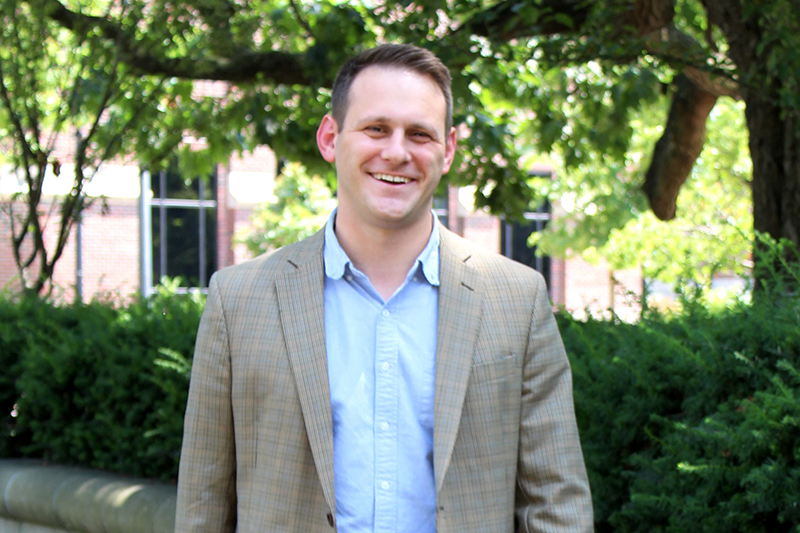March 4, 2021
Purdue professor receives Multidisciplinary University Research Initiative funding from Department of Defense

Brett Savoie (photo provided)
WEST LAFAYETTE, Ind. — Brett Savoie, the Charles Davidson Assistant Professor of Chemical Engineering at Purdue University, will lead one of 25 teams receiving Multidisciplinary University Research Initiative (MURI) funding from the Department of Defense as part of the fiscal year 2021 competition.
As principal investigator, Savoie and his team of researchers from Purdue, the University of Pittsburgh and Carnegie Mellon University will conduct research within the topic of predicting organic molecular decomposition. Specifically, the team will establish an “Informatics Paradigm for Predicting Organic Chemical Stability.”
This project initiates a multiyear effort to develop the tools and data necessary to predict how organic molecules degrade under stress.
“This is a complex problem where there is a significant gap between where the science currently stands and where it needs to be in order to design novel molecules and materials in many applications,” Savoie said. “The investment by the Office of Naval Research to sponsor a MURI dedicated to this topic comes at a perfect time because recent developments in machine learning and high-throughput experiments will allow us to tackle this problem in a way that would have been impossible a decade ago.”
Savoie explained that winning this award is significant on many levels. “The MURI is always highly competitive, so our team is gratified that our proposal was awarded. In addition, MURIs are a serious long-term investment on the part of the DoD and taxpayers to address mission-critical problems, so we are honored to have the opportunity to execute on our research plan. In particular, MURIs fund teams of researchers for the duration necessary to authentically advance the state of the art, which is what we intend to do.”
The team has put together an aggressive research plan focused on delivering data-driven approaches to predicting the stability of organic species. This will occur on several fronts, from leveraging modern computational throughput to address data scarcity. The group will use machine learning to accelerate the time-to-solution for characterizing how things break down and develop software to put these tools in the hands of the larger research community.
“To carry out this plan, we’ve assembled a world-class team of researchers, including both computational and experimental members, who will work in tandem to validate and translate these methods to general use,” Savoie said.
“While we have gotten pretty creative at designing molecules with exotic properties, predicting how they will stand up in use environments still eludes us. The purpose of this MURI is to develop the computational and experimental tools to be able to predict in advance how stable a new chemistry will be in a given application.”
The winning teams, which represent 57 academic institutions nationwide, will receive five-year grants, contingent upon satisfactory research progress and the availability of funds, to pursue basic research that spans multiple scientific disciplines.
Savoie joined Purdue’s Davidson School of Chemical Engineering in 2017. His research group focuses on accelerating the design and characterization of energy-related materials using theoretical methods. Burgeoning computational power and algorithm development have made theoretical characterization and screening essential steps in modern materials development. From first-principles predictions of electronic structure, catalytic activity and even crystal structure — methods development continue to push the frontier of what material properties can be predicted in advance, thus economizing costly synthesis and optimization efforts.
About Purdue University
Purdue University is a top public research institution developing practical solutions to today’s toughest challenges. Ranked the No. 5 Most Innovative University in the United States by U.S. News & World Report, Purdue delivers world-changing research and out-of-this-world discovery. Committed to hands-on and online, real-world learning, Purdue offers a transformative education to all. Committed to affordability and accessibility, Purdue has frozen tuition and most fees at 2012-13 levels, enabling more students than ever to graduate debt-free. See how Purdue never stops in the persistent pursuit of the next giant leap at https://purdue.edu/.
Media contact: Kayla Wiles, 765-494-2432, wiles5@purdue.edu
Writer: Jennifer Merzdorf
Source: Brett Savoie, bsavoie@purdue.edu
Journalists visiting campus: Journalists should follow Protect Purdue protocols and the following guidelines:
- Campus is open, but the number of people in spaces may be limited. We will be as accommodating as possible, but you may be asked to step out or report from another location.
- To enable access, particularly to campus buildings, we recommend you contact the Purdue News Service media contact listed on the release to let them know the nature of the visit and where you will be visiting. A News Service representative can facilitate safe access and may escort you on campus.
- Correctly wear face masks inside any campus building, and correctly wear face masks outdoors when social distancing of at least six feet is not possible.
Note to journalists: Journalists visiting campus should follow visitor health guidelines.

